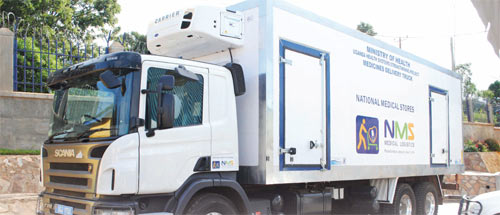MPs criticize NMS over drug shortages in hospitals
The report, which primarily focused on regional referral hospitals—including Masaka, Entebbe, Mbale, Jinja, Mubende, and Fort Portal—along with specialized institutions like Mulago National Women Specialized Hospital, found that NMS had failed in several key areas.

Members of Parliament on the Committee on Statutory Agencies and State Enterprises (COSASE), have expressed deep concern over the National Medical Stores’ (NMS) inability to ensure a consistent supply of essential drugs to government health facilities.
Some of these facilities have gone months without vital medications. The criticism comes in the wake of a damning 171-page report by the Auditor General for the fiscal year ending June 30, 2023, which highlighted numerous shortcomings in the country’s health delivery system.
The report, which primarily focused on regional referral hospitals—including Masaka, Entebbe, Mbale, Jinja, Mubende, and Fort Portal—along with specialized institutions like Mulago National Women Specialized Hospital, found that NMS had failed in several key areas.
Notably, it cited the agency’s inability to collect expired drugs from hospitals, causing confusion in storage facilities and leading to potential risks for both staff and patients.
The MPs called for immediate action, directing their concerns towards the Ministry of Finance’s permanent secretary and secretary to the treasury, Ramathan Ggoobi.
The committee urged Ggoobi to reprimand NMS for what they see as a clear failure to fulfill its mandate.
The lawmakers were particularly alarmed by the prolonged drug shortages, which they say have contributed to unnecessary suffering among Ugandans seeking medical care in government facilities.
“The National Medical Stores’ inefficiency in delivering essential drugs is not just a bureaucratic issue, but a life-and-death matter for the ordinary Ugandan. This is unacceptable, and we demand accountability,” one MP stated during the committee’s session.
In addition to the challenges with NMS, the COSASE report pointed out significant financial shortfalls affecting hospitals across the country.
The committee recommended that the government increase the funding sent to hospitals, ensuring they have the necessary resources to meet the growing healthcare demands.
One of the most striking examples highlighted by the report was Butabika National Referral Mental Hospital, which is in dire need of a 5 billion Shilling allocation to complete its perimeter wall.
Butabika’s financial situation is emblematic of the struggles faced by other public health institutions, many of which operate under severe budget constraints, unable to improve infrastructure or deliver adequate services.
The report noted that of the 13,576 patients admitted to Butabika between June 2022 and June 2023, a shocking 2,175 had escaped before completing treatment, further emphasizing the need for improved security and infrastructure.
One of the key failings identified in the Auditor General’s report was NMS’s negligence in managing expired drugs across regional hospitals.
Several facilities were found to have unused, expired medicines still in storage, creating confusion and logistical challenges for staff trying to manage limited storage space.
The MPs argue that this failure not only impacts hospital efficiency but also raises questions about public safety.
“Leaving expired drugs in storage poses a significant risk. It clutters vital spaces and increases the likelihood of expired medications being mistakenly used,” a committee member warned.
COSASE’s report called for both immediate and long-term solutions. Beyond reprimanding NMS, the MPs suggested that the government should increase financial support to hospitals to ensure they can meet their operational demands.
This includes improvements in infrastructure, such as Butabika’s perimeter wall, and ensuring hospitals have adequate funds to address critical issues such as drug shortages and staffing.
The committee concluded that without substantial reforms and increased oversight, Uganda’s public health sector will continue to struggle, leaving many citizens without the care they need.
The lawmakers stressed that healthcare is a priority that cannot be compromised, and the government must take swift action to rectify the system’s current failings.
The report has now been submitted to Parliament, where it is expected to fuel further debate and calls for more aggressive measures to ensure accountability within Uganda’s healthcare system.







